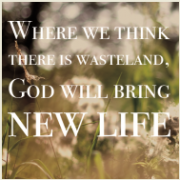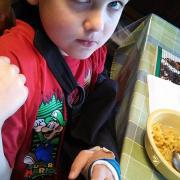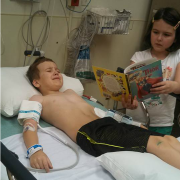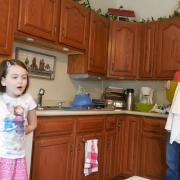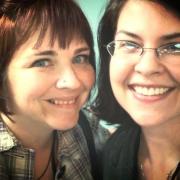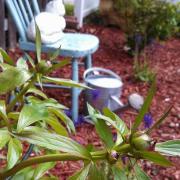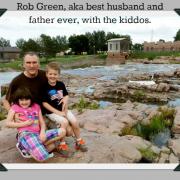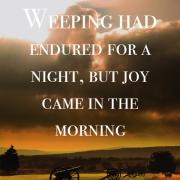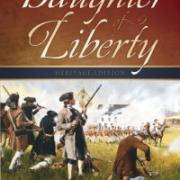When I turned in Spy of Richmond to my publisher last July, I was without a contract for the first time in seven years. At first, I felt both free and untethered, which I realize sounds the same, but whereas freedom is desirable, being untethered felt uncomfortable. I felt both of these things in equal parts, in alternating stages. It sounds weird, because it was weird. Life was suddenly, drastically, different. And sometimes, different is good. :) It has been a wonderful sabbatical for me. So what have I done with myself this year without a book to write? Here's 20 things. (Not an exhaustive list.)
I supported/support my husband, who is now in grad school on top of working full-time. For years, he has taken care of the kids in the evenings and on weekends so I could write. He has put up with a limited rotation of meals and with a house that could be cleaner. Now it's my turn and my privilege to support him. [[{"type":"media", "view_mode":"media_large", "fid":"1204", "attributes":{"class":"media-image aligncenter size-full wp-image-2987", "typeof":"foaf:Image", "style":"", "width":"550", "height":"432", "alt":"Robandkids"}}]]
I went on more family outings. Whenever I've been on a deadline in the past, my husband would take the kids on these great field trips so I could have time at home alone to write. This was lovely and generous of him, and incredibly helpful. But it also meant the family memories were being made without me. This year, I was in on it. SO glad. [[{"type":"media", "view_mode":"media_large", "fid":"1205", "attributes":{"class":"media-image aligncenter size-full wp-image-2971", "typeof":"foaf:Image", "style":"", "width":"550", "height":"550", "alt":"FamilyFun"}}]]
I read! I read books written by other people, fiction and nonfiction, and oh what bliss!! [[{"type":"media", "view_mode":"media_large", "fid":"1206", "attributes":{"class":"media-image aligncenter size-full wp-image-2968", "typeof":"foaf:Image", "style":"", "width":"550", "height":"316", "alt":"IRead"}}]]
I organized my tupperware cabinet and my children's legos. Also got rid of two huge bags of old toys the kids have outgrown. Can I get an amen? I mean come on. This is really something. [[{"type":"media", "view_mode":"media_large", "fid":"1207", "attributes":{"class":"media-image aligncenter size-full wp-image-2972", "typeof":"foaf:Image", "style":"", "width":"550", "height":"465", "alt":"Organized"}}]]
I worked out, and not just once. This is saying quite a lot for me. But I am happy to say I am now in the habit of regularly working up a sweat. Don't tell Jillian Michaels it's mostly to test the theory that exercise promotes good ideas, and I'm more interested in that than in having a "rocking body."
I blogged more. And pinned more.
I kept my haircut appointments. When I'm on deadline, I cancel these in order to get more writing time. As I look back at pictures, I can tell how stressed I am by how long and frizzy my hair is. Ick.
I taught three units of American Girl History at our local homeschool co-op. I homeschooled our kids last year too, but this year I actually had time to prepare and teach weekly classes with other people's kids. [[{"type":"media", "view_mode":"media_large", "fid":"1208", "attributes":{"class":"media-image aligncenter size-full wp-image-2973", "typeof":"foaf:Image", "style":"", "width":"550", "height":"550", "alt":"americangirl"}}]]
I cleaned the tops of my kitchen cabinets. Among other things, of course.
I did more public speaking.
I saw a photo of myself during said public speaking and realized my desperate need for a personal stylist. Signed up for StitchFix. Fell in love.
We adopted a cat. He was to be our only family pet. We named him Oreo because he's a tuxedo cat. Too late, I kicked myself for not lobbying for Catticus Finch. [[{"type":"media", "view_mode":"media_large", "fid":"1209", "attributes":{"class":"media-image aligncenter size-full wp-image-2974", "typeof":"foaf:Image", "style":"", "width":"450", "height":"294", "alt":"Oreo"}}]]
We adopted another cat. Named him Rolo. Should have named him Purrman Meowville. (I did not come up with that, but it would have fit. Rolo purs like nobody's business.) [[{"type":"media", "view_mode":"media_large", "fid":"1210", "attributes":{"class":"media-image aligncenter size-full wp-image-2976", "typeof":"foaf:Image", "style":"", "width":"550", "height":"302", "alt":"Rolo"}}]]
I took a lot of pictures of said cats. Couldn't help myself. (I also love dogs, for the record.) [[{"type":"media", "view_mode":"media_large", "fid":"1211", "attributes":{"class":"media-image aligncenter size-full wp-image-2979", "typeof":"foaf:Image", "style":"", "width":"450", "height":"819", "alt":"Morecats"}}]]
I took a lot of pictures, in general. In other words, I lived in the moment, enjoying the present instead of constantly calculating how to squeeze in more writing time. [[{"type":"media", "view_mode":"media_large", "fid":"1212", "attributes":{"class":"media-image aligncenter size-full wp-image-2980", "typeof":"foaf:Image", "style":"", "width":"550", "height":"336", "alt":"crazyEthan2"}}]]
I tried new recipes! And I have always been sure to make a huge deal of this accomplishment at the dinner table every time it happens! Being on a deadline does not allow any of my brain cells to be creative with the menu. None. So this is a major deal.
I spent time with friends, in person and via Skype. Oh, how heavenly.[[{"type":"media", "view_mode":"media_large", "fid":"1213", "attributes":{"class":"media-image aligncenter size-full wp-image-2986", "typeof":"foaf:Image", "style":"", "width":"550", "height":"486", "alt":"Susie-and-me-1024x882"}}]]
I cleaned out my gardens this spring even before it's warm enough to plant things. This is highly unusual for me. I also made out my wishlist of landscaping items to buy as soon as the weather is consistently above freezing at night: Japanese maple tree, feather reed ornamental grass, purple coneflower, a few yews, some annuals like sweet potato vine and verbena and pansies and impatiens... My garden is going to look great this year!
I took some naps. I decorated for the seasons. I hovered over guided my daughter more during her violin practices. I started teaching my son piano. I switched to shopping at Aldi's and slashed our grocery bill by 30-40 percent. Wowza!
I brainstormed and researched future book ideas. Because even though I really needed this sabbatical, I'm not done writing. [[{"type":"media", "view_mode":"media_large", "fid":"1214", "attributes":{"class":"media-image aligncenter size-full wp-image-2981", "typeof":"foaf:Image", "style":"", "width":"450", "height":"676", "alt":"library stack2"}}]]
After getting over that initial untethered feeling, I have thoroughly enjoyed the last nine months. It was exactly what I needed!
Pssst...
The footnote to this blog post--and it's a fairly big one--is that my sabbatical is now officially over. A few days ago, I signed a contract. [[{"type":"media", "view_mode":"media_large", "fid":"1215", "attributes":{"class":"media-image aligncenter size-full wp-image-2983", "typeof":"foaf:Image", "style":"", "width":"550", "height":"279", "alt":"contract"}}]] If you're signed up for my enewsletter, you'll get the details next week. If you're not signed up yet--see the form in the footer! It's easy! See you in your inbox!

